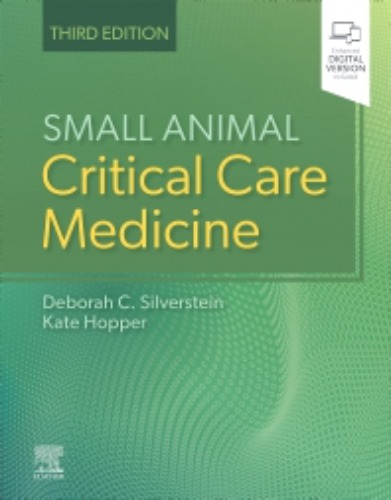
- tel010-4724-3240
- fax02-447-3074
- time9시-18시
현재 위치
[P0000DEK] Small Animal Critical Care Medicine, 3rd Edition (종이책+eBook) 


() 해외배송 가능
| 판매가 | |
|---|---|
| 소비자가 | 190,000원 |
| 적립금 |
|
| 무이자할부 | |
| 제조사 | |
| 원산지 | |
| 상품코드 | P0000DEK |
| 수량 |
|
| 국내/해외배송 | |
| SNS 상품홍보 | |
| QR코드 |
|
| QR코드 보내기 |
   
|
event
상품상세정보
2008년 초판 발간시 응급에서 critical care를 분리하여 독립 타이틀로 큰 의미가 있는 책이고 그에 따른 반응도 좋았습니다.
2판도 업데이트가 많이 되어 급격하게 변화하고 발전하는 임상환경에 맞추어 줬고요
3판은 아래와 같은 점이 변화, 개정 또는 추가되었습니다.
0. 이북이 기본 제공
1. tracheal stents, urinary diversion techniques 등 추가
2. 쇼크 수액요법과 수혈에 대한 내용 추가
3. 알고리즘 추가
4. 혈액응고계에 대한 내용 업데이트
Small Animal Critical Care Medicine, 3rd Edition
ISBN Number 9780323764698
Main Author By Deborah Silverstein, DVM, DACVECC and Kate Hopper, BVSc, MVSc, DACVECC
Trim 276 x 216 (8 1/2 x 10 7/8)
Imprint Saunders
Page Count 1280
Publication Date 15 Dec 2022
Description
- NEW! Coverage of high-flow nasal oxygen therapy and both core and advanced concepts for mechanical ventilation helps you deliver high-quality care to patients with respiratory failure.
- NEW! Chapters on current critical care topics include Assessment of Intravascular Volume, Urine Osmolality and Electrolytes, and Infectious Disease Control in the ICU.
- NEW! Chapters on novel procedures offer coverage of tracheal stents, urinary diversion techniques, and an in-depth review of point-of-care ultrasound with extensive figures and images.
- NEW! Coverage of increasingly prevalent problems seen in the intensive care unit includes coagulation disorders of the critically ill patient, feline aortic thromboembolism, oxygen toxicity, and treatment of severe hypertension.
- NEW! Chapters on shock fluid therapy and transfusion therapy provide cutting edge information on how to prevent complications and maximize resources.
- NEW! Prevention of Compassion Fatigue and Burnout chapter addresses this major challenge currently affecting the veterinary profession.
- NEW! Algorithms and figures throughout the text clarify key concepts and aid in diagnosis and treatment.
- NEW! Enhanced eBook, included with the purchase of a new print copy of the book, provides online access to a fully searchable version of the text and makes its content available on various devices.
- UPDATED! Coagulation section includes chapters on hemostasis, management of the bleeding patient, coagulation and platelet monitoring, and viscoelastic monitoring.
- EXPANDED! Pharmacology section offers coverage of cannabis, trazadone, gabapentin, pimobendane, and appetite stimulants.
- Over 200 concise, thoroughly updated chapters cover all the clinical areas needed for evaluating, diagnosing, managing, and monitoring a critical veterinary patient.
- More than 150 recognized experts and many new authors offer in-depth, authoritative guidance on emergency and critical care clinical situations from a variety of perspectives.
- A problem-based approach focuses on clinically relevant details.
- Hundreds of full-color illustrations with updated photos and videos depict various emergency procedures, such as chest tube placement.
- Handy appendices offer quick access to the most often needed calculations, conversion tables, continuous rate infusion determinations, reference ranges, and more.
- Practical, user-friendly format makes reference quick and easy with summary tables, boxes highlighting key points, illustrations, and algorithmic approaches to diagnosis and management.
Table Of Contents
PART I: KEY CRITICAL CARE CONCEPTS
1. Evaluation and Triage of the Critically Ill Patient
2. Physical Examination and Daily Assessment of the Critically Ill Patient
3. Hemostasis
4. Cardiopulmonary Resuscitation
5. Post-Cardiac Arrest Care
6. Classification and Initial Management of Shock States
7. SIRS, MODS and Sepsis
8. Oxygen Toxicity
9. Endothelial Surface Layer
10. Hyperthermia and Fever
11. Interstitial Edema
12. Patient Suffering in the Intensive Care Unit
13. Predictive Scoring Systems in Veterinary Medicine
PART II: RESPIRATORY DISORDERS
14. Control of Breathing
15. Oxygen Therapy
16. Hypoxemia
17. Hypoventilation
18. Upper Airway Disease
19. Tracheal Collapse: Management and Indications for Tracheal Stents
20. Feline Bronchopulmonary Disease
21. Canine Lower Airway Disease
22. Pulmonary Hypertension
23. Pulmonary Edema
24. Pneumonia
25. Acute Respiratory Distress Syndrome
26. Pulmonary Contusions and Hemorrhage
27. Pulmonary Thromboembolism
28. Chest Wall Disease
29. Pleural Space Disease
30. Respiratory Distress Look-Alikes
PART III: ADVANCED RESPIRATORY SUPPORT
31. High-Flow Nasal Oxygen
32. Mechanical Ventilation — Core Concepts
33. Mechanical Ventilation — Advanced Concepts
34. Jet Ventilation
35. Ventilator Waveforms
36. Anesthesia and Monitoring of the Ventilator Patient
37. Nursing Care of the Ventilator Patient
38. Discontinuing Mechanical Ventilation
39. Ventilator Induced Lung Injury
40. Ventilator-Associated Pneumonia
PART IV: CARDIOVASCULAR DISORDERS
41. Mechanisms of Heart Failure
42. Ventricular Failure and Myocardial Infarction
43. Feline Cardiomyopathy
44. Canine Cardiomyopathy
45. Canine Myxomatous Mitral Valve Disease
46. Blunt Cardiac Injury
47. Pericardial Diseases
48. Bradyarrhythmias and Conduction Disturbances
49. Supraventricular Tachyarrhythmias
50. Ventricular Tachyarrhythmias
51. Myocarditis
52. Cardiac Biomarkers
53. Systemic Hypertension
54. Cardiopulmonary Bypass
PART V: ELECTROLYTE AND ACID-BASE DISTURBANCES
55. Sodium Disorders
56. Potassium Disorders
57. Calcium Disorders
58. Magnesium and Phosphate Disorders
59. Traditional Acid-Base Analysis
60. Non-Traditional Acid-Base Analysis
61. Hyperlactatemia
62. Urine Osmolality and Electrolytes
PART VI: FLUID THERAPY
63. Assessment of Hydration
64. Volume Assessment
65. Crystalloids and Hemoglobin-Based Oxygen-Carrying Solutions
66. Colloid Solutions
67. Daily Intravenous Fluid Therapy
68. Shock Fluids and Fluid Challenge
69. Transfusion Medicine
70. Blood Types, Pre-transfusion Compatibility and Transfusion Reactions
71. Hemorrhagic Shock
PART VII: ENDOCRINE DISORDERS
72. The Diabetic Patient in the ICU
73. Diabetic Ketoacidosis
74. Hyperglycemic Hyperosmolar Syndrome
75. Hypoglycemia
76. Diabetes Insipidus
77. Syndrome of Inappropriate Antidiuretic Hormone
78. Thyroid Storm
79. Hypothyroid Crisis in the Dog
80. Pheochromocytoma
81. Critical Illness-Related Corticosteroid Insufficiency
82. Hypoadrenocorticism
PART VIII: NEUROLOGIC DISORDERS
83. Neurological Evaluation of the ICU Patient
84. Seizures and Status Epilepticus
85. Intracranial Hypertension
86. Tetanus
87. Hepatic Encephalopathy
PART IX: INFECTIOUS DISORDERS
88. Hospital-Associated Infections and Zoonoses
89. Febrile Neutropenia
90. Sepsis and Septic Shock
91. Bacterial Infections
92. Fungal Infections
93. Viral Infections
94. Canine Parvovirus Infection
95. Infective Endocarditis
96. Urosepsis
97. Necrotizing Soft-Tissue Infections
98. Catheter-Related Bloodstream Infection
99. Multi-Drug Resistant Infections
100. Infectious Disease Control in the ICU
PART X: HEMATOLOGIC DISORDERS
101. Hypercoagulable States
102. Feline Aortic Thromboembolism
103. Platelet Disorders
104. Coagulopathy in the ICU
105. Management of the Bleeding Patient in the ICU
106. Anemia in the ICU
107. Dyshemoglobinemia
108. Acute Hemolytic Disorders
PART XI: INTRAABDOMINAL DISORDERS
109. Acute Abdominal Pain
110. Acute Pancreatitis
111. Acute Cholecystitis
112. Hepatitis and Cholangiohepatitis
113. Hepatic Failure
114. Portal Hypertension
115. Portosystemic Shunt Management
116. Acute Gastroenteritis
117. Gastrointestinal hemorrhage
118. Regurgitation and Vomiting
119. Diarrhea
120. Peritonitis
PART XII: UROGENITAL DISORDERS
121. Acute Kidney Injury
122. Chronic Kidney Disease
123. Kidney Transplantation
124. Nutritional Assessment
125. Nutritional Modulation of Critical Illness
126. Enteral Nutrition
127. Parenteral Nutrition
PART XIII: TRAUMA
128. Traumatic Brain Injury
129. Wound Management
130. Thermal Burn Injury
PART XIV: ANESTHESIA AND PAIN MANAGEMENT
131. Pain Assessment
132. Sedation of the Critically Ill Patient
133. Anesthesia in the Critically Ill Patient
134. Analgesia and Constant Rate Infusions
135. Physical Rehabilitation for the Critical Care Patient
136. Integrative Veterinary Medicine for the Intensive Care Unit Patient
PART XV: ENVIRONMENTAL EMERGENCIES
137. Smoke Inhalation
138. Hypothermia
139. Heat Stroke
140. Drowning and Submersion Injury
PART XVI: MISCELLANEOUS DISORDERS
141. Anaphylaxis
142. Gas Embolism
143. Subcutaneous Emphysema
144. Ocular Disease in the Intensive Care Unit
145. Critically Ill Neonatal and Pediatric Patients
146. Critically Ill Geriatric Patients
PART XVII: PHARMACOLOGY
147. Catecholamines
148. Vasopressin
149. Antihypertensives
150. Pimobendan
151. Diuretics
152. Appetite Stimulants
153. Gastrointestinal Protectants
154. Antiemetics and Prokinetics
155. Opioid Agonists and Naloxone
156. Benzodiazepines
157. Alpha-2 Agonists and Antagonists
158. Nonsteroidal Anti-Inflammatory Drugs
159. Gabapentin
160. Tramadol
161. Trazodone
162. Cannabinoid Medicine in Intensive Care Unit Patients
163. Anticonvulsants
164. Antiplatelet Drugs
165. Anticoagulants
166. Thrombolytic Agents
167. Hemostatic Drugs
168. Antiarrhythmic Agents
169. Inhaled Medications
170. Complications of Chemotherapeutic Agents
171. Antitoxins and Antivenoms
PART XVIII: ANTIMICROBIAL THERAPY
172. Antimicrobial Use in the Critical Care Patient
173. Beta Lactam Antimicrobials
174. Aminoglycosides
175. Fluoroquinolones
176. Antifungal Therapy
177. Inhaled Medications
PART XIX: Extracorporeal Therapy
178. Renal Replacement Therapies
179. Apheresis
180. Extracorporeal Therapies for Blood Purification
PART XX: MONITORING
181. Hemodynamic Monitoring
182. Cardiac Output Monitoring
183. Electrocardiogram Evaluation
184. Oximetry Monitoring
185. Colloid Osmotic Pressure and Osmolality Monitoring
186. Coagulation and Platelet Monitoring
187. Viscoelastic Monitoring
188. Intraabdominal Pressure Monitoring
189. Point-of-Care Ultrasound in the ICU
190. Capnography
191. Intracranial Pressure Monitoring
192. Urine Output
PART XXI: PROCEDURES
193. Peripheral Venous Catheterization
194. Intraosseous Catheterization
195. Central Venous Catheterization
196. Blood Film Evaluation
197. Endotracheal Intubation and Tracheostomy
198. Thoracocentesis
199. Thoracostomy Tube Placement and Drainage
200. Abdominocentesis
201. Arterial Catheterization
202. Blood Gas Sampling
203. Temporary Cardiac Pacing
204. Cardioversion
205. Defibrillation
206. Cerebrospinal Fluid Sampling and Interpretation
207. Urinary Catheterization
208. Urinary Diversion Techniques
PART XXII: ICU DESIGN AND MANAGEMENT
209. ICU Facility Design
210. Management of the Intensive Care Unit
211. Client Communication, Grief, and Veterinary Wellness
212. Prevention of Compassion Fatigue and Burnout
Appendices
| |
배송 정보
- 배송 방법 : 택배
- 배송 지역 : 전국지역
- 배송 비용 : 3,000원
- 배송 기간 : 2일 ~ 5일
- 배송 안내 : - 산간벽지나 도서지방은 별도의 추가금액을 지불하셔야 하는 경우가 있습니다.
고객님께서 주문하신 상품은 입금 확인후 배송해 드립니다. 다만, 상품종류에 따라서 상품의 배송이 다소 지연될 수 있습니다.
고객님께서 주문하신 도서라도 도매상 및 출판사 사정에 따라 품절/절판 등의 사유로 취소될 수 있습니다. 입금확인이 되면 익일발송(주말,공휴일제외)을 원칙으로 합니다.
교환 및 반품 정보
교환 및 반품이 가능한 경우
- 상품을 공급 받으신 날로부터 7일이내 내용이 파본일 경우
단, 비닐포장을 개봉하였거나 내용물이 훼손되어 상품가치가 상실된 경우에는 교환/반품이 불가능합니다.
- 공급받으신 상품 및 용역의 내용이 표시.광고 내용과
다르거나 다르게 이행된 경우에는 공급받은 날로부터 3월이내, 그사실을 알게 된 날로부터 30일이내
교환 및 반품이 불가능한 경우
- 고객님의 책임 있는 사유로 상품등이 멸실 또는 훼손된 경우. 단, 상품의 내용을 확인하기 위하여
포장 등을 훼손한 경우는 제외
- 포장을 개봉하였거나 포장이 훼손되어 상품가치가 상실된 경우
- 고객님의 사용 또는 일부 소비에 의하여 상품의 가치가 현저히 감소한 경우
- 시간의 경과에 의하여 재판매가 곤란할 정도로 상품등의 가치가 현저히 감소한 경우
- 복제가 가능한 상품등의 포장을 훼손한 경우
(자세한 내용은 고객만족센터 1:1 E-MAIL상담을 이용해 주시기 바랍니다.)
※ 고객님의 마음이 바뀌어 교환, 반품을 하실 경우 상품반송 비용은 고객님께서 부담하셔야 합니다.






































